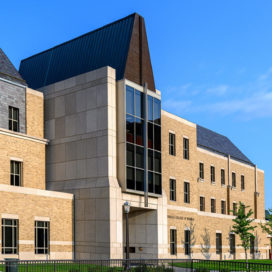Executive training & careers: An NBR special review
Published: February 11, 2005 / Author: David Zealand)
New Zealand’s institutions of business learning have again failed to crack the ranks of the world’s leading MBA programmes, according to the latest global survey of business schools to be published by Britain’s Financial Times.
As they have in the past, American institutions tended to dominate this year’s annual survey, with the business schools of the universities of Pennsylvania, Harvard and Columbia once again nabbing the top three “best” places overall.
The two biggest risers in the influential table this year were Esade Business School, in Barcelona and the Mendoza school at the University of Notre Dame, in the US.
But the biggest international story by far appeared to be the rise of Chinese schools – Ceibs in Shanghai (up to 22 from 53 last year); Hong Kong UST (up to 44 from 69); and the Chinese University of Hong Kong (a new entry at 69).
The FT rankings tend to be highly regarded by businesses for their rigorous methodology and audit of the reporting data supplied by business schools.
As well, the air miles separating the London-based paper and the grand US schools, in particular, are considered to lend the survey an independent edge over similar rankings published stateside.
To rank the programmes in 2005, the paper surveyed both alumni and the business schools themselves, capturing information about salary and perceptions about the programmes’ value for money. Also measured was the diversity of students, faculty and board members, and the variety and strengths of teaching and research.
According to the paper, Ceibs’ surge was due to the 191% salary increase experienced by alumni.
As almost all those graduates are Chinese and worked in China before and after graduation, this would appear to be a sign of Chinese companies economically growing by leaps and bounds – as well as placing newfound value on the MBA degree.
The FT also ranked Melbourne Business School 63rd in the world, ahead of the Australian Graduate School of Management, which dropped 31 slots to the position of 84.
The Australian schools were among only five in the Asia-Pacific to receive a ranking.
No New Zealand school showed up in the latest rankings, despite the appearance of MBA programmes at schools from at least two countries with similar-sized economies – Ireland and Singapore.
Among prospective students with an eye for the world’s best, the survey’s influence continues to be “critical,” admitted Des Graydon, dean of the Auckland University of Technology’s business faculty, which last year established a new MBA programme. About 125 students are enrolled at the AUT programme, which is too young to be considered for the FT survey.
Nevertheless, in comments echoed by other local educators, “what we’re providing is quite different, really,” from the types of programmes offered by the global beaters, Mr Graydon said.
For one thing, an MBA earned locally will probably cost as little as one-sixth of the $150,000-plus tag on similar two-year programmes in the US.
“New Zealand schools definitely shouldn’t feel comfortable about not being ranked. But in terms of competing with the Harvards of the world, it’s just not realistic to be making these comparisons.”
Added Paul McDonald, the director of Victoria University’s 21-year-old MBA programme: “The ranking game is an important one, no doubt. But my view continues to be that you really shouldn’t go into it unless you’re going to do very well.”
Like other local institutions, Victoria did not offer its 100-strong programme this year for the FT’s scrutiny.
“It’s fine for schools in countries where you have corporations coming through your front door – but that simply isn’t happening here, and I doubt if it ever will,” Dr McDonald said, noting New Zealand still tended to do well in similar global surveys looking at quality of life, such as the one published recently by the Economist.
“We have academically attractive qualities alright, just not the kinds of ones you see surveyed by the FT.”
WORLD’S ‘BEST’ MBA PROGRAMMES 2005
|
1 |
University of Pennsylvania : Wharton |
|
(US) |
|
|
1= |
Harvard Business School |
|
|
(US) |
|
3 |
Columbia Business School |
|
|
(US) |
|
4 |
Stanford University GSB |
|
|
(US) |
|
5 |
London Business School |
|
|
(UK) |
|
6 |
University of Chicago GSB |
|
|
(US) |
|
7 |
Dartmouth College : Tuck |
|
|
(US) |
|
8 |
Insead |
|
|
France / Singapore |
|
9 |
Yale School of Management |
|
|
(US) |
|
9= |
New York University : Stern |
|
|
(US) |
(Financial Times)
/news_and_events/news_articles/article/3767/executive-training-amp-careers-an-nbr-special-review
Related Stories




